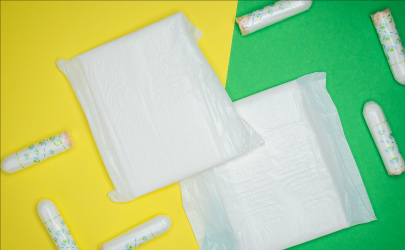Sustainable Menstruation: The Rise of Biodegradable Sanitary Napkins in Asia Pacific

"The Asia Pacific biodegradable sanitary napkins market is witnessing significant growth, driven by increasing consumer awareness of environmental sustainability and health consciousness. Countries like India, China, and Japan are leading the demand due to rising disposable incomes and changing attitudes towards menstrual hygiene. The market is characterized by a shift from conventional products to eco-friendly alternatives, such as those made from organic cotton and bamboo fiber. Manufacturers are innovating to meet this demand, focusing on biodegradable materials and sustainable production methods. As governments promote eco-friendly initiatives, the region is poised for substantial expansion in the coming years."
The Asia Pacific Biodegradable Sanitary Napkins market was valued at USD 0.740 Billion in 2023 and is projected to reach USD 2.76 Billion by 2030, with a compound annual growth rate (CAGR) of 21.0% from 2024 to 2030.
The increasing awareness of environmental issues has created a substantial market for biodegradable sanitary napkins, particularly among eco-conscious consumers. Government initiatives that promote sustainability are also contributing to the growing demand.
However, high production costs and limited availability can impede market penetration. Moreover, consumer resistance to higher prices compared to conventional products presents a challenge for wider adoption, particularly in price-sensitive markets.
1. Growing Environmental Awareness
As environmental concerns rise globally, the Asia-Pacific region is witnessing a heightened consciousness about sustainability. Consumers, particularly younger generations, are increasingly aware of the adverse effects of plastic waste on ecosystems. This awareness has prompted many to seek alternatives to conventional menstrual products, which often contribute significantly to landfill waste. Environmental campaigns, social media advocacy, and educational programs play a crucial role in informing the public about the importance of using biodegradable products. As a result, brands that promote eco-friendly sanitary napkins are gaining traction, positioning themselves as responsible choices for environmentally conscious consumers. This shift not only influences purchasing decisions but also encourages more companies to innovate in sustainable product design.
2. Urbanization and Rising Disposable Incomes
The rapid urbanization in countries such as India, China, and Southeast Asian nations is changing lifestyles and consumer behavior. The migration of more people to urban areas has led to an increase in disposable income, allowing consumers to spend on premium, eco-friendly products. Urban populations have greater access to information about health and hygiene, leading to a demand for innovative solutions that align with modern values. As more women join the workforce, there is a growing need for convenient, high-quality menstrual products. Biodegradable sanitary napkins are appealing to urban consumers who prioritize effectiveness and environmental impact. This dual focus on convenience and sustainability is driving market growth, as consumers seek products that suit their dynamic lifestyles while being mindful of their ecological footprint.
3. Health and Hygiene Consciousness
A growing emphasis on health and hygiene is significantly impacting the demand for biodegradable sanitary napkins in the Asia-Pacific region. Consumers are increasingly aware of the potential health risks associated with synthetic materials in traditional menstrual products, such as chemicals and fragrances that may cause irritation or allergic reactions. Biodegradable options, often made from organic or natural materials, are seen as safer and more hygienic alternatives. This trend is further supported by the rising education levels among women regarding personal health, leading to a proactive approach in choosing menstrual products. Women are not only seeking effectiveness but also prioritizing their well-being, which leads them to products that promise safety and sustainability, thus driving the growth of the biodegradable segment.
4. Government Initiatives and Regulations
Governments in the Asia-Pacific region are increasingly realizing the importance of sustainable practices. This has led to the introduction of initiatives aimed at reducing plastic waste. Regulatory measures, such as bans on single-use plastics and incentives for eco-friendly products, are encouraging manufacturers to innovate in the biodegradable segment. For example, some countries are running awareness campaigns about sustainable menstrual products and providing subsidies to companies that produce them. These initiatives are creating a supportive environment for the growth of biodegradable sanitary napkins, making them more accessible to consumers. Additionally, government collaboration with NGOs and environmental organizations is helping to educate the public about the benefits of transitioning to sustainable alternatives, thereby accelerating market adoption.
5. Increase in Startups and Innovation
The Asia-Pacific region has experienced a rise in startups focusing on sustainable menstrual products, leading to increased innovation and variety in the market. Entrepreneurs are acknowledging the growing consumer demand for biodegradable options and are creating unique solutions tailored to local needs and preferences. These startups often utilize cutting-edge technologies and materials to produce products that are not only eco-friendly, but also effective and affordable. Their flexibility enables them to promptly respond to market trends and consumer feedback, further enhancing their appeal. As these innovative companies gain momentum, they challenge established brands to adjust and expand their product lines, fostering a dynamic and competitive market environment that emphasizes sustainability.
Competitive Landscape
Some of the major companies operating within the Biodegradable Sanitary Napkins market are: Carmesi, Saathi, Pee Safe, Natracare, Bamboo Babe, Delipap Oy, EnviroBren, Planera,Organyc, Plastfree, Sparkle, Niine Sanitary Napkins and Others.